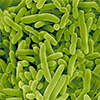| Sep 26, 2023 |
|
|
|
(Nanowerk News) A group of synthetic bacteria that can efficiently turn plastic waste into useful chemicals is presented in Nature Communications (“Engineering microbial division of labor for plastic upcycling”). These bacteria could help to tackle the growing problem of plastic pollution and produce valuable chemicals and products — used in adhesives, insulators, and to make nylon, for example.
|
|
International researchers have genetically engineered two synthetic bacteria they say can help turn plastic waste into more useful chemicals. The two bacteria strains come from the soil bacterium Pseudomonas putida, and the researchers say they can process the common plastic polyethylene terephthalate and create terephthalic acid and ethylene glycol. These two products can then be used in the production of materials used in insulators, foams, coatings, adhesives and nylon, they say. The researchers add that their results show the possibilities of engineering bacteria to create new options for sustainability.
|
|
Plastic pollution is an escalating global crisis, with far-reaching adverse effects on the environment, wildlife, and human health. One proposed solution is upcycling plastics into products using engineered microorganisms, but this is highly complex and has been challenging.
|
|
Ting Lu, James Collins and colleagues designed two genetically engineered strains of the soil bacterium Pseudomonas putida to upcycle one of the most common plastics, polyethylene terephthalate. Each strain processed the breakdown of one of the two products produced by chemical plastic breakdown — terephthalic acid and ethylene glycol. By forming a consortium, these strains were found to achieve a greater efficiency compared to using only a single strain that processed both products.
|
|
The bacteria further upcycled the plastic by converting it into the biodegradable polymer PHA and muconate, which can be used to synthesize polyurethane and adipic acid. Polyurethane is used in insulators, foams, coatings, adhesives, and adipic acid is used to make nylon.
|
|
The findings suggest that engineering microbial communities may be a promising and effective platform to facilitate polymer upcycling and environmental sustainability. Additionally, the underlying concept and strategies are potentially applicable to the treatment of other types of plastics, the authors suggest.
|

